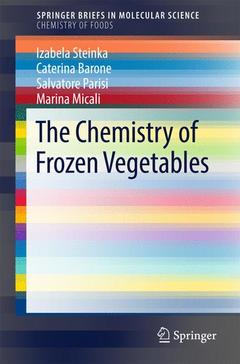Description
The Chemistry of Frozen Vegetables, 1st ed. 2017
Chemistry of Foods Series
Authors: Steinka Izabela, Barone Caterina, Parisi Salvatore, Micali Marina
Language: English
Subjects for The Chemistry of Frozen Vegetables:
52.74 €
In Print (Delivery period: 15 days).
Add to cartSupport: Print on demand
Description
/li>Contents
/li>Biography
/li>Comment
/li>
This Brief presents a chemical perspective on frozen vegetables, also known as ?ready-to-use? foods. It elucidates the chemical properties and modifications of vegetables from harvest and treatment to the end of their long shelf-life. Particular attention is given to the microbiological colonization of vegetables during the freezing treatments and to the chemical and physical modifications associated. The authors explore the undesired effects of this colonization through the lens of the antibiotic-resistant Staphylococci found in hermetically-package frozen vegetables. With this informative and instructive Brief, readers will understand the importance of the frozen storage technologies.
Professor Izabela Steinka is specialised in microbiology and food hygiene. She is a professor at the Maritime University in Gdynia, and she is particularly interested in microbiological interactions. The topics of her recent research comprise health promotion and biological aspects of packaging, which are related to her didactic work at the Medical University in Gdansk and College of Health and Beauty in Gdynia. Her published works include ‘Hygiene in Commerce and Service Sector’ (2007), ‘Prognostics of Microbiological Interactions” (2007), ‘Lactic Acid Cheese Safety’ (2008), and ‘Microbiology of Food and Industrial Materials’ (2011).
Caterina Barone is an experienced author in the field of food science and quality audits. She is an ISO 9001-auditor in different sectors, including also professional training services. Her recent works are focused on food packaging hygiene, chemical and technological features of cheeses and other prepared foods, dedicated BASIC software, and microbial toxins in different foods for human consumption. In addition, Caterina has studied the evolution of public safety and hygiene in the European Union with relation to foods and beverages by means of the RASFF system. At present, she is also vice president of the Association ‘Componiamo il Futuro’ (CO.I.F.) in Palermo, Italy, working in the field of professional training.
Salvatore Parisi is a chemist and food scientist, working as a consultant for the food industry and as a lecturer in the academia. He obtained his MSc in Chemistry from the University of Palermo, and a PhD from the University of Messina (Italy). Dr. Parisi is also a Preventive Controls Qualified Individual (PCQI) after the successful completion of the FSPCA Preventive Controls for Human Food course in 2016 (according to new U.S. regulations). He serves as series editor for the SpringerBriefs in Molecular Science: Chemistry of Foods and he is a member of the Editorial Board of differ
These books may interest you

Quality in Frozen Food 158.24 €

Lactic Acid in the Food Industry 52.74 €


